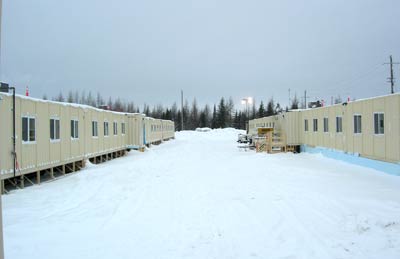 Steve Marshall, vice-president of the Morris Group of Companies, sees an industry-changing landscape about to rise across North America built on steel boxes, and it’s starting in Northern Ontario.
Steve Marshall, vice-president of the Morris Group of Companies, sees an industry-changing landscape about to rise across North America built on steel boxes, and it’s starting in Northern Ontario.
Morris Modular, in a partnership with CS Enterprises, a Moose Cree First Nations business, is currently erecting an 800-person camp for workers at the Ontario Power Generation Lower Mattagami Project, north of Kapuskasing.
Historically, work camps for projects of this nature, as well as in the mining and oil and gas industries, have been based entirely on conventional, wood-constructed trailers.
Morris Modular is changing the way work camps are built by utilizing retrofitted steel shipping containers.
When completed in June, the OPG work camp will feature more than 500 retrofitted shipping containers connected together to create an energy efficient facility, and one that will stand the test of time as the camp will become First Nations housing once the project is over.
Marshall can’t wait for that curtain to be lifted in June. It will be validation for their belief in this type of technology.
“It’s our Canadian showpiece,” Marshall said. “It’s a shift in mentality, and seeing is believing. It’s the first project of its kind in Canada. Shipping container modules have been used overseas for years, but they haven’t been used in Canada until now. Canada has been very resistant to anything not wood based. It will turn a lot of heads in the industry and we hope it can change people. We’re dealing with major engineering firms, the provincial government and one of the world’s largest contractors. We are cognizant of the fact that our performance and end product on this project is our make it, or break it -and we will deliver.”
Once the camp is completed and fully operational, Marshall sees the demand for retrofitted shipping container modules increasing as more and more companies realize the benefits over conventional trailers.
Benefits
“The proof is in the pudding,” he said. “Our mission is to change the trailer camp business. The containers have all kinds of benefits over conventional trailers. They’re more rigid because they’re made out of steel. They’re meant to be moved and stacked. The units come prefabricated, complete with bedrooms and washrooms. They don’t have to be built on site, just connected together. It’s like Lego. Their lifespan is five times longer if not more. They’re green and 100 per cent recyclable. The insulation is moisture resistant, so there are no mould issues. We believe in them. We are aggressively bidding on a number of large-scale projects right now across Canada and internationally in the camp business and the hotel industry, and the commercial and industrial sectors. They can be used for all kinds of applications.”
A spinoff company, Globe Modular Ltd., has forged a relationship with China and has a facility there that manufactures the containers using a Canadian team. The finished containers are shipped to Vancouver and trucked to the OPG site for easy assembly.
The Morris Group of Companies has big plans for introducing retrofitted shipping container technology to North America.
“We don’t want to be a one-hit wonder,” Marshall said. “We need to procure other projects. The hardest part is over … dealing with the mentality shift to new technology. It was a battle to get here. There was a lot of resistance from people used to seeing wood-based technology. A few other people tried this before and were unsuccessful. The competitors didn’t want the technology here. It was easy for fingers to be pointed and say it’s too high risk. Most people said it couldn’t be done. It can be done and it is being done.”
Marshall points to a strong relationship with First Nations communities as a key reason Morris Modular won the OPG work camp project. CS Enterprises general manager Bobby Cheechoo toured the first phase of the camp and stood inside the retrofitted containers. Cheechoo has no doubt the technology will catch on fast.
“This is the future here,” Cheechoo said. “It’s exciting to be part of a venture that changes the industry. I was really impressed with the modules. You can decorate the outside of them just like any house. They’re a solid product and more companies will want them.”
The Morris Group of Companies is also in the process of establishing a housing construction company for Northern Ontario utilizing custom-designed structural insulated panels, and will build a plant in Cochrane in the spring. Other ventures include the Niska Career Academy in Cochrane (a partnership with the Moose Cree First Nation and Moose Band Development Corporation), a staffing company for the mining industry called Work Force and a First Nations payroll and management company called Work North.
“In 2010, we launched seven companies. This year is about sewing our seeds,” Marshall said.

